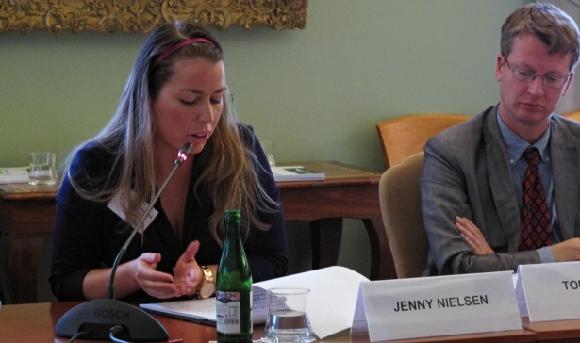Jenny Nielsen: The concerns of Eastern Europe make the Prague Agenda useful
Jenny Nielsen is currently a Postdoctoral Research Fellow at the School of Political Science and International Studies at the University of Queensland (Australia), and she is researching the 'humanitarian initiative' leading up to the 2015 NPT Review Conference. Previously based in the UK, she was a Research Analyst with the Non-Proliferation and Disarmament Programme at the International Institute for Strategic Studies (IISS), a Programme Manager for the Defence & Security Programme at Wilton Park (an executive agency of the UK’s Foreign and Commonwealth Office), and a Research Assistant for the Mountbatten Centre for International Studies (MCIS) at the University of Southampton. At the MCIS, was tasked with co-editing the 2004-2012 editions of the NPT Briefing Book. She holds a PhD from the University of Southampton which focused on the U.S. nuclear non-proliferation policy vis-à-vis Iran in the 1970s. Jenny's research focuses on nuclear non-proliferation and disarmament policy issues, particularly the multilateral Non-proliferation Treaty (NPT) review process.
What did the conference Prague Agenda 2014 represent to you?
The Prague Agenda conference was a very timely gathering of nuclear policy experts. It was especially timely because it occurred ahead of the Vienna Humanitarian Conference, and the strategic issues and concerns about the Russia-Eastern Europe relations were highlighted in it. This issue was disregarded by many civil society groups in Vienna, who fail to appreciate the strategic realities and concerns of many Eastern European states in the current geo-political climate.
Could The Prague Agenda, as an international meeting of experts on global nuclear issues, be a useful way to work towards global nuclear disarmament?
The Prague Agenda conferences could be very useful fora for nuclear experts and policy-makers, since at these conferences, they could convene outside the US and the UK to discuss nuclear policy issues. The concerns of Eastern Europe make the Prague Agenda especially useful, as different perspectives are represented there. In many US/UK conferences, the Eastern European participation/perspective is not as prevalent, and hence the perspective is often skewed in the discussions.

Jenny Nielsen (foto: UMV)
What do regional perspectives on nuclear disarmament represent to you?
Regional perspective on nuclear disarmament are important coalitions in the multilateral diplomatic fora.
What are the biggest global challenges and threats for contemporary society in your opinion?
The most pressing global challenges and threats for society at this time are climate change, terrorism, and poverty/inequality.
How can nuclear arms control and non-proliferation be intensified?
Nuclear arms control and non-proliferation policy can be strengthened by furthering confidence-building and trust amongst key states through Track 1.5 dialogues.
How can nuclear weapons be reduced in your opinion?
Nuclear weapons reductions—beyond the superfluous and agreed bilateral US-Russia reductions—can take place once the strategic and security concerns of states possessing these weapons are assuaged through other means, including perhaps alternate/new regional alliances, security guarantees and possibly even alternate advanced conventional weapons systems.
What is the future of the CTBT (Comprehensive Nuclear-Test-Ban Treaty) in light of what has been said at the Prague Agenda?
I think there should be a renewed focus on promoting the CTBT’s entry into force. Its ratification by all the Annex II states, even if North Korea would be the one outlier, would strengthen the confidence between states - both states which are party to the NPT and those which are not party to the NPT. Such a focus on the CTBT could assist in restoring some of the credibility in the non-proliferation regime regarding commitment to Article VI (NPT) implementation, as there is currently a perceived lack of credibility in this respect.
How do you see the situation regarding nuclear-free zone countries?
The Middle East WMD-free zone issue is going to be a very contentious issue at the 2015 NPT Review Conference. The failure of regional states to agree on an agenda for a conference in Helsinki is going to have implications for reaching consensus on a Final Document at the 2015 NPT Review Conference.
What do you think about the cooperation between nuclear states and countries from nuclear-free zones?
States from NWFZs and the NPT NWS cooperate on nuclear non-proliferation and nuclear security goals and priorities even if they disagree on pathways and timelines for the nuclear disarmament implementation. This collaborative relationship in relation to such non-proliferation, counter-proliferation and nuclear security priorities could potentially be affected by the lack of commitment to the implementation of nuclear disarmament priorities, which is perceived by non-nuclear weapon states in NWFZs.
Was this Conference useful for your own work? How?
The 2014 Prague Agenda conference was very useful for my research on nuclear disarmament and the NPT review process. The presentations, conversations and networking with the participants, especially those from Eastern Europe and Russia, enriched my appreciation of the many divergent and regional dimensions of the global nuclear policy issues being discussed at the UN.
Interviewed by: Eliška Hrušovská
About the author
Eliška Hrušovská has a Bachelor of Arts in International Relations and European Studies as well as a Bachelor of Arts in Management of Leisure Time and Recreation – Recreology. She was a project intern during the Prague Agenda conference at the Institute of International Relations in Prague. She does volunteering even in her leisure time. She worked as a volunteer for organisations such as the Amnesty International, Forum 2000 Czech Republic or for the United Nations Information Centre Prague. Her academic research concerns global governance and leadership, interpersonal relations, global conflicts and international security, non-governmental organisations, and global civil society. She is currently working on her Master's thesis: Global civil society of the 21st century: challenges and threats (2015, MUP).